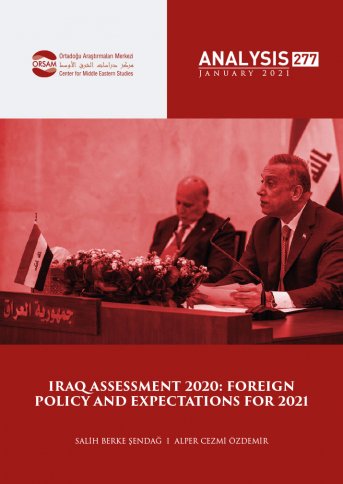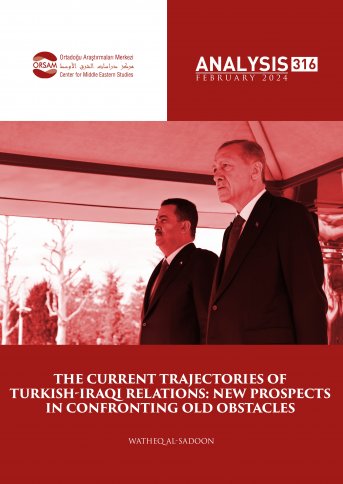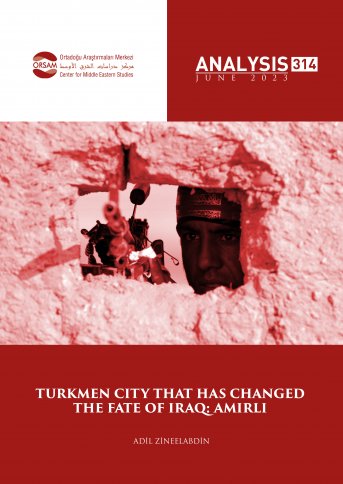
Iraq Assessment 2020: Foreign Policy and Expectations for 2021
Mustafa al-Kadhimi, who became the fifth Prime Minister of Iraq in the post-2005 period, after forming the government on May 6, 2020, showed that Iraqi foreign policy would be built upon three basic principles as laid out in the government programme submitted to the Parliament: “sovereignty, balance and cooperation”. Accordingly, Prime Minister al-Kadhimi, during the first eight months of his tenure, made diplomatic visits to Iran, the USA, Jordan, France, Germany, the United Kingdom and Turkey, respectively, and concluded 2020 with another visit to Jordan and met with King Abdullah. In the meantime, Foreign Minister Fuad Hussein, Minister of Finance Ali Allawi, Minister of Oil Ihsan Abdul Jabbar and Head of Hashd al-Shaabi Council, Faleh al-Fayyad, and other high-profile people, engaged in intense diplomacy and visited, in addition to the aforementioned countries, Saudi Arabia, Kuwait, Egypt, Bahrain, Lebanon, Syria, Russia, the Netherlands and Belgium. Considering the effects of the current coronavirus pandemic, the fact that Prime Minister al-Kadhimi and his Ministers visited 15 different countries in a span of eight months, clearly demonstrates that the Iraqi government pursues an active foreign policy and diplomacy.
In fact, following the formation of the new government, Baghdad became a popular stop for many Foreign Ministers in the Middle East. Within eight months, the Foreign Ministers of Kuwait, Jordan, Saudi Arabia, Finland, France, and Greece paid visits to Baghdad, not to mention the high-profile visits of Egyptian Prime Minister Mostafa Madbouly and French President Emmanuel Macron. During the same period, Iraqi diplomats placed equal importance on communication with regional and global supra-state actors in addition to interstate relations. For instance, Foreign Minister Fuad Hussein met with Jens Stoltenberg, the NATO Secretary General, and Josep Borrell, Vice President of the European Commission, and the High Representative of the Union for Foreign Affairs and Security Policy in Belgium and paid a visit to Egypt to meet with Ahmed Aboul Gheit, the Secretary General of the Arab League. He also had a meeting with Dr. Nayef Falah M. Al-Hajraf, the Secretary General of the Cooperation Council for the Arab States of the Gulf, in addition to bilateral meetings with the Foreign Ministers of Oman, Bahrain, Saudi Arabia and South Korea during the same summit.
Prime Minister al-Kadhimi and his ministers usually focused on the ongoing fight against ISIS, the coronavirus pandemic, falling Brent oil prices, the financial recession and other problems affecting Iraq and the regional conjecture. During his meetings with his European peers, al-Kadhimi praised Germany, France and the United Kingdom, all a part of the International Coalition, for their support to Iraq in the fight against ISIS and encouraged those countries to invest in Iraq. During his European tour, Al-Kadhimi shared the details of his economic reform plan with European investors and public. In a similar manner, al-Kadhimi thanked Iran and the USA for their efforts against ISIS and expressed his desire for stronger relations with them. Especially, the dialogues ongoing with the important players of Egypt, Jordan, Kuwait and Saudi Arabia for oil and energy, raise the question whether the policy of balance adopted by Iraq is now being tipped in favor of the Arab world. Nevertheless, since the fight against ISIS is not over yet, security issues are still at the forefront of any discussions Iraqi politicians have with foreign players. Despite this fact, it is noteworthy that the al-Kadhimi government opted for an economic diplomacy to encourage investment in Iraq’s oil and energy areas during their meetings.








